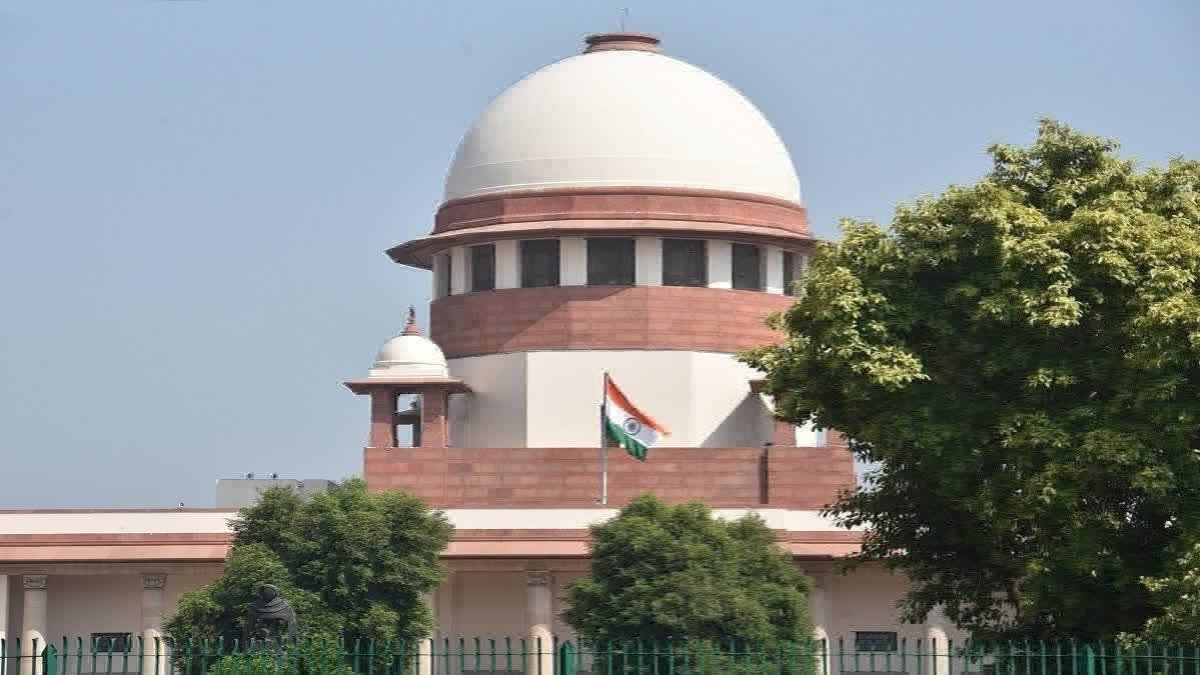New Delhi: The Supreme Court on Friday said not every intentional insult or intimidation of a member of a SC/ST community will result into a feeling of caste-based humiliation, and it is only in those cases where the intentional insult or intimidation takes place either due to the prevailing practice of untouchability or to reinforce the historically entrenched ideas.
Citing a judgment by the apex court, a bench of Justices J B Pardiwala and Manoj Misra said, referring to the statements of objects and purposes of the Scheduled Castes and Scheduled Tribes (Prevention of Atrocities) Act, 1989 it was observed by this court, that the object behind the introduction of the Act, 1989 was to afford statutory protection to the Scheduled Castes and the Scheduled Tribes, who were terrorised and subjected to humiliation and indignations upon assertion of their civil rights and resistance to the practice of untouchability.
“For this reason, mere fact that the person subjected to insult or intimidation belongs to a Scheduled Caste or Scheduled Tribe would not attract the offence under Section 3(1)(r) (of the Act) unless it was the intention of the accused to subject the concerned person to caste-based humiliation”, said Justice Pardiwala, who authored the 70-page judgment on behalf of the bench.
Citing Bhikhu Parekh’s paper titled “Logic of Humiliation”, the bench said the inflexible nature of the basis of inequalities leads to the existence of a more structural and systemic form of humiliation, as the perpetrator is assured of its place in the structure of the society owing to its immobility. “Since no one can be assured of the same in a modern liberal society which is marked by vertical mobility in the social structure, there is no incentive for anyone to have a regimented system of humiliation”, said Justice Pardiwala.
Justice Pardiwala said that what appears is that the expression “intent to humiliate” as it appears in Section 3(1)(r) of the Act, 1989 must necessarily be construed in the larger context in which the concept of humiliation of the marginalised groups has been understood by various scholars. “It is not ordinary insult or intimidation which would amount to ‘humiliation’ that is sought to be made punishable under the Act, 1989”, he said.
“In our considered view, it is in a similar vein that the term ‘humiliation’ as it appears in Section 3(1)(r) of the Act, 1989 must be construed, that is, in a way that it deprecates the infliction of humiliation against members of the Scheduled Castes and Scheduled Tribes wherein such humiliation is intricately associated with the caste identity of such members”, said Justice Pardiwala.
The apex court made these observations while granting anticipatory bail to YouTuber Shajan Skaria, who runs the "Marunadan Malayali" channel on the video-streaming platform. The bench said an offence under the SC-ST Act is not established merely on the fact that the complainant is a member of a Scheduled Caste or Scheduled Tribe community unless there is an intention to humiliate.
Skaria had challenged the denial of anticipatory bail to him by the Kerala High Court in a criminal case lodged against him by MLA P V Sreenijin.
Sreenijin had got the FIR lodged for offences under the Scheduled Castes and Scheduled Tribes (Prevention of Atrocities) Act against Skaria, alleging that he had intentionally humiliated the lawmaker by making false allegations through a video uploaded on "Marunadan Malayali".
The apex court said it is not the purport of the Act, 1989 that every act of intentional insult or intimidation meted by a person who is not a member of a Scheduled Caste or Scheduled Tribe to a person who belongs to a Scheduled Caste or Scheduled Tribe would attract section 3(1)(r) of the Act, 1989 merely because it is committed against a person who happens to be a member of a Scheduled Caste or Scheduled Tribe.
The apex court said not every intentional insult or intimidation of a member of a SC or ST community will result in a feeling of caste-based humiliation. "It is only in those cases where the intentional insult or intimidation takes place either due to the prevailing practice of untouchability or to reinforce the historically-entrenched ideas like the superiority of the 'upper castes' over the 'lower castes or untouchables', the notions of 'purity' and 'pollution' etc. that it could be said to be an insult or intimidation of the type envisaged by the Act, 1989," said Justice Pardiwala.
Citing the case, the apex court said having regard to the reprehensible conduct and the nature of the derogatory statements made, Skaria at best could be said to have prima facie committed the offence of defamation punishable under section 500 of the Indian Penal Code (IPC).
The bench made it clear that there is nothing to even "prima facie" indicate that Skaria, by releasing the video on YouTube, promoted or attempted to promote feelings of enmity, hatred or ill-will against the members of the Scheduled Castes or Scheduled Tribes.
"The video has nothing to do in general with the members of the Scheduled Castes or Scheduled Tribes. His target was just the complainant alone. The offence under section 3(1)(u) will come into play only when any person is trying to promote ill-feeling or enmity against the members of the Scheduled Castes or Scheduled Tribes as a group and not as individuals," the bench said.
Read More



